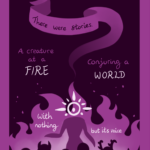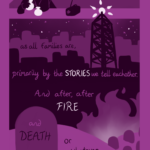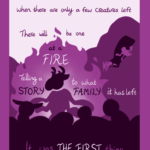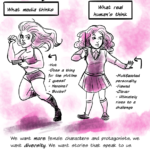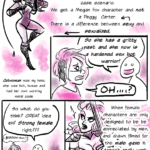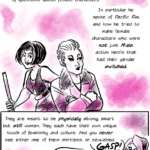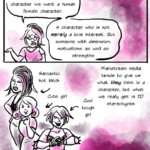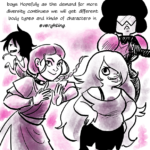Write a story where the main characters fuck up. Like, they let someone die because they were scared, or they reject a possible romantic interest out of snobbery and/or belief that nobody would have interest in them. Let your characters burn bridges, and let their mistakes have consequences. Some things are unforgivable, and it’s okay to have your main characters do these things. Everybody’s done something they regret. It’s hard (for me, personally) to do this because I love my characters so much, and I want them to succeed all the time, but it’s not realistic, and more importantly, it doesn’t make for as interesting as a story.
“if it’s not plot relevant, cut it!!” is such awful writing advice
if JRR Tolkien had cut every bit of Lord of the Rings that wasn’t directly related to the central plot, it would have been just one book long, COLOURLESS and DULL AS DIRT.
all the little worldbuilding/character details are what draw you in and give the central plot weight, FOOL
I agree 100% I’m currently writing a book and I tend to focus on the little quirks of the characters because it helps the readers get to know them better
It’s not awful writing advice. It’s good writing advice. What it’s saying is that you should carefully consider each and every word.
Does this paragraph pull its weight?
Does this chapter slow the pace of the story? Is that what I want here?
Can I merge this scene with another to create a stronger single scene?
What that advice is telling you to do is to make sure what you’re writing is the best it can be. That doesn’t mean you have to follow it 100%. But consider it while you’re writing.
I honestly feel like both Tolkien and George RR Martin would’ve been served by cutting some scenes. HOWEVER, I like tightly paced books, not sprawling slogs through the swamps of discovery writing.
Your mileage may vary.
I mean i fundamentally disagree with you on that last part (i love a long, thick, meaty book) but you’re also misunderstanding what i mean (which is understandable, this was just a ranty little post that i didn’t expect much of anyone to reblog)
there’s a difference between “plot" and “story”
there are a lot of great stories that have very little in the way of central plot (ever read the hitchhiker’s guide to the galaxy? there’s hardly any plot to that at all, it’s just a long series of diversions and narrative blind alleys) and even in more focused stories (someone else in the notes of this post brought up Hamlet as an example), it’s extraneous scenes, not directly related to the plot, that make the strongest impression on the audience and lend weight to the more central events. The “alas, poor yorick” scene? totally unrelated to the main plot, yet thematically essential to the story and arguably the most evocative and iconic scene from the play
yes, by all means don’t waste your audience’s time with things that add nothing, but if you pull a hemingway and trim your story down to the bare minimum outline of the plot, i for one will find it all but impossible to become immersed in the story. The best plot ever written can be let down by a lack of narrative muscle and fat around it but even the most flimsy plot can be saved by sufficiently entertaining padding.
I know I’ve talked about this before, but I’m really sick of seeing writers who should know better say things like, “Tragedy is more compelling than stories where characters have a nice day and nothing bad happens!” without understanding why.
Tragedy is an effective story element when it’s a deviation from the norm. A character’s peaceful existence is disrupted by a catastrophic event that throws everything into chaos. The character now has to either develop so they can cope with the new status quo, or find a way to put things back the way they were. There’s a good story in that.
But when a character’s life is an unrelenting cavalcade of misery, another heaping dose of shit isn’t all that interesting. At that point, a compelling deviation from the norm would be said character having a nice day where nothing bad happens. And modern fiction is chock-full of misery porn, so by this logic, it’s no wonder the coffee shop AU is such a popular fanfiction trope.
Derek Hale getting a dog and putting his life back together is way more interesting than Derek Hale’s life getting worse for the 26th consecutive episode.
Creators like to hold up “everything is fine and nobody dies” as a sign that fanfic is bland and badly written, but if anything, it’s an indicator that mainstream fiction is bland and badly written.
What are the chances of the Cassablanc-esque plane scene was actually John and sherlock saying goodbye to those deeper feelings? Because if they choose to keep Mary/baby around in Series 4, they can’t riddle that with johnlock subtext nearly as much. Is it possible that the plane was the acknowledgement that those feelings were there, and now its time to say goodbye to them? Thats the feeling I’m getting.
the-hedgehogs-have-the-tardis:
loudest-subtext-in-television-d:
Standard disclaimer of “this is just my reading” here…
If the series ended there, then maybe. But it’s got two more series. The Casablanca parallel is set up to nod to the audience that the romantic feelings are 1) present, and 2) mutual. Sherlock’s plane turning around signifies that isn’t where the romantic story ends, that the writers intend to do something different. I said this earlier: They always do what they’ve seen done before, then add a twist or subvert it, and then take it a step further. They didn’t parallel Casablanca just to copy Casablanca, that’s not their style.
Past that, it would be incredibly bizarre to build up to romantic feelings for the entire duration of the show thus far, and then quietly bury them. I mean, there are no rules in storytelling, but balance of probability is that’s not what they’re going for: it wouldn’t satisfy hardly anyone, it would be a very unusual story to tell, and since practically the only thing we can be assured of is that John and Sherlock are going to spend their lives together, it’d be an odd decision that two guys who used to have feelings for each other just sexlessly live together later in life. It would be even weirder to set up things like Mary being as selfish as she is, and the Holmes parents as the only healthy relationship on the show as a mirror for Johnlock, if we’re going to be left with John and Mary.
I’m kind of surprised so many people think writing a baby — or anything — into the show means whelp, that’s it! It doesn’t mean anything for any story, much less Sherlock. Guys, Moriarty blew his brains out. That’s what storytelling is: you set up seemingly insurmountable obstacles so your characters can overcome them. You don’t set up obstacles to just shackle your narrative onto a narrow path.
I know we’re all used to really mediocre shows outside of Sherlock, but these writers know what they’re doing when it comes to character development and planning. Everything we saw in series 3 was prepped for in series 2, which was prepped for in series 1. Moftiss care a lot about their adaptation and thought about it for years, they’re not just flailing around trying to keep a show on the air indefinitely without a goal in sight. When someone is good at crafting stories, they will absolutely tear your heart out in the middle and make you wonder how anything will ever be okay again. If it didn’t look like John was going to end up with Mary right now, if things didn’t look hopeless, it would be a considerably shittier show.
Refer back to the signposts and you’ll see this is absolutely consistent with a narrative arc for a romance, and not consistent with much else. It’s taking this long because we’re not building up to a slapdash relationship, but a moving one. It hurts because it’s being done well.
Very nicely put.
Loudest-Subtext, if my hopes are dashed in the end I’m blaming you. JK. Well sort of.

